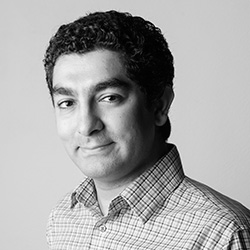Aydin Farajidavar, is the director of Integrated Medical Systems (IMS) Laboratory and an Associate Professor of Electrical and Computer Engineering at New York Institute of Technology. Before joining New York Tech, he was a Post-doctoral fellow in the School of Electrical and Computer Engineering at the Georgia Institute of Technology. He received the Ph.D. degree in Biomedical Engineering from the joint program of the University of Texas at Arlington and the University of Texas Southwestern Medical Center, Dallas in 2011. His research experience and interest include a broad range from modeling of biological systems, to development of wireless platforms to acquire and process biological signals.
At New York Tech, Farajidavar established the IMS-Lab, where he and his students conduct cutting-edge research to develop the next generation of implantable and wearable medical devices. His research program has been supported by the National Science Foundation, National Institutes of Health, Auckland Bioengineering Institute, and New York Tech. He is teaching fundamental electrical engineering courses such as electronics, digital circuits, etc. He has developed a novel course entitled "Implantable Medical Devices: An Embedded Systems Approach" to infuse research into teaching, and educate the new generation of students on trending issues such as health and medicine. Farajidavar's research has been highlighted by various awards, news articles, magazine articles, etc. His students have been consistently awarded locally, nationally, and internationally, and been hired in leading engineering firms and companies.
Farajidavar has authored more than 50 peer-reviewed journal and conference papers/abstracts, and is a member of the Institute of Electrical and Electronics Engineers (IEEE). He has served as the reviewer for government funding agencies, Journals and conferences. He serves on the Technical Program Committee (TPC) for MTT-10 of IEEE MTT-S, and Microwave Theory and Techniques Society. He has served as organizer and TPC member for several IEEE conferences, including IEEE EMBC, BioCAS, IMBioC, RWW, IMWS, WAMICON, to name a few.
Recent Projects/Research
- “An Implantable Wireless System to Study Gastric Neurophysiology", (Contact PI/PD), NIH-U18, Award No. 1 U18 EB021789, (total $813,335), Sept. 30 2015 – Jul. 31 2019.
- "Restoring Gastric Motility: A Model-Based Solution for Closed-Loop Implantable Pulse Generators", (PI) funded by New York Tech, Institutional Support for Research and Creativity ($10,711.54), Sept. 1 2015 – Aug. 31 2016.
- "A Multichannel Implantable System for Monitoring Gastric Electrical Activities", (PI) funded by New York Tech, Institutional Support for Research and Creativity ($10,570.00), Sept. 1 2014 – Aug. 31 2015.
- "Acquisition of a DC/RF Sputtering System to Support Multi-disciplinary Research on Medical Sensors and Micro-generators in WBAN", (Co-PI) funded by National Science Foundation (NSF-MRI), Award No. ECCS-1337965, ($230,063.00), Sept 1 2013 – Aug. 31 2016.
- "Performance Based Research: Wireless Sensing of Gastric Electrical Activity", (Co-PI), funded by Auckland Bioengineering Institute (ABI), the University of Auckland at New Zealand (NZ$4,500), March 2013.
Publications
- Farajidavar, “Bioelectronics for Mapping Gut Activity”, Brain Research, vol. 1693, Part B, pp. 169–173, Aug. 2018.
- R. Wang, Z. Abukhalaf, A. Javan-Khoshkholgh, T. H. Wang, LK Cheng, G. O’Grady, N. Paskaranandavadivel, A Farajidavar, “A miniature configurable wireless system for recording gastric electrophysiological activity and delivering high-energy electrical stimulation”, IEEE J. Emerging and Selected Topics in Circuits and Systems (JETCAS), vol. 8, no. 2, pp. 221–229, Jun. 2018.
- N. Paskaranandavadivel, R. Wang, S. Sathar, G. O'Grady, LK Cheng, A Farajidavar, "A wireless multichannel system for in-vivo monitoring of gastric activity propagation", Neurogastroenterology & Motility, vol. 27, no. 4, pp. 580-585, Apr. 2015.
- A. Farajidavar, C. E. Hagains, Y. B. Peng, J.-C. Chiao, "A Closed Loop Feedback System for Automatic Detection and Inhibition of Mechano-nociceptive Neural Activity", IEEE Transaction on Neural Systems and Rehabilitation Engineering, vol. 20, no. 4, pp. 478-487, Jul. 2012.
- A. Farajidavar, G. O'Grady, S. M. Rao, L. K. Cheng, T. Abell, J.-C. Chiao, "A Miniature Bidirectional Telemetry System for in-vivo Gastric Slow Wave Recordings", Journal of Physiological Measurement, vol. 33, no. 6, pp. N29-N37, May 2012 (Featured Article).
- A. Farajidavar, J. L. Seifert, J. E. Stearns, Y. Seo, M. R. Delgado, S. Sparagana, M. I. Romero, J.-C. Chiao, "A Wireless System for Monitoring Transcranial Motor Evoked Potentials", Annals of Biomedical Engineering, vol. 39, no. 1, pp. 517-23, Jan. 2011.
- A. Farajidavar, S. Saeb, K. Behbehani, "Incorporating Synaptic Time-Dependent Plasticity and Dynamic Synapse into a Computational Model of Wind-up" Neural Networks, vol. 21, no. (2-3), pp. 241-9, Dec. 2008.
Honors + Awards
- Recipient of the Poster of Distinction for presentation at Digestive Disease Week 2017 (rated in the top 10% of all AGA abstracts).
- Recipient of the 2015 Innovator of the Year Award in the category of Science and Technology from Innovate Long Island (LI).
- Recipient of Outstanding Young Engineer Award from IEEE Long Island Section, 2014; for pioneering contributions to the development of medical devices for treatment of chronic pain and gastric disease diagnosis.
- Paper received Robert Stern Award (Best Young Investigator Award) from the 2014 International Gastrointestinal Electrophysiology Society Workshop.
- Recipient of "Alfred and Janet Potvin Outstanding Bioengineering Student Award", 2011.
- Recipient of Outstanding Research Poster Award in the UT Metroplex day, held annually between UT-Arlington, -Dallas and -Southwestern Medical School, 2009.
Courses Taught at New York Tech
- EENG 125: Fundamentals of Digital Logic
- EENG 650: Implantable Medical Devices: An Embedded Systems Approach
- EENG 270: Introduction to Electronic Circuits
- EENG 489/491: Senior Design Project I and II
